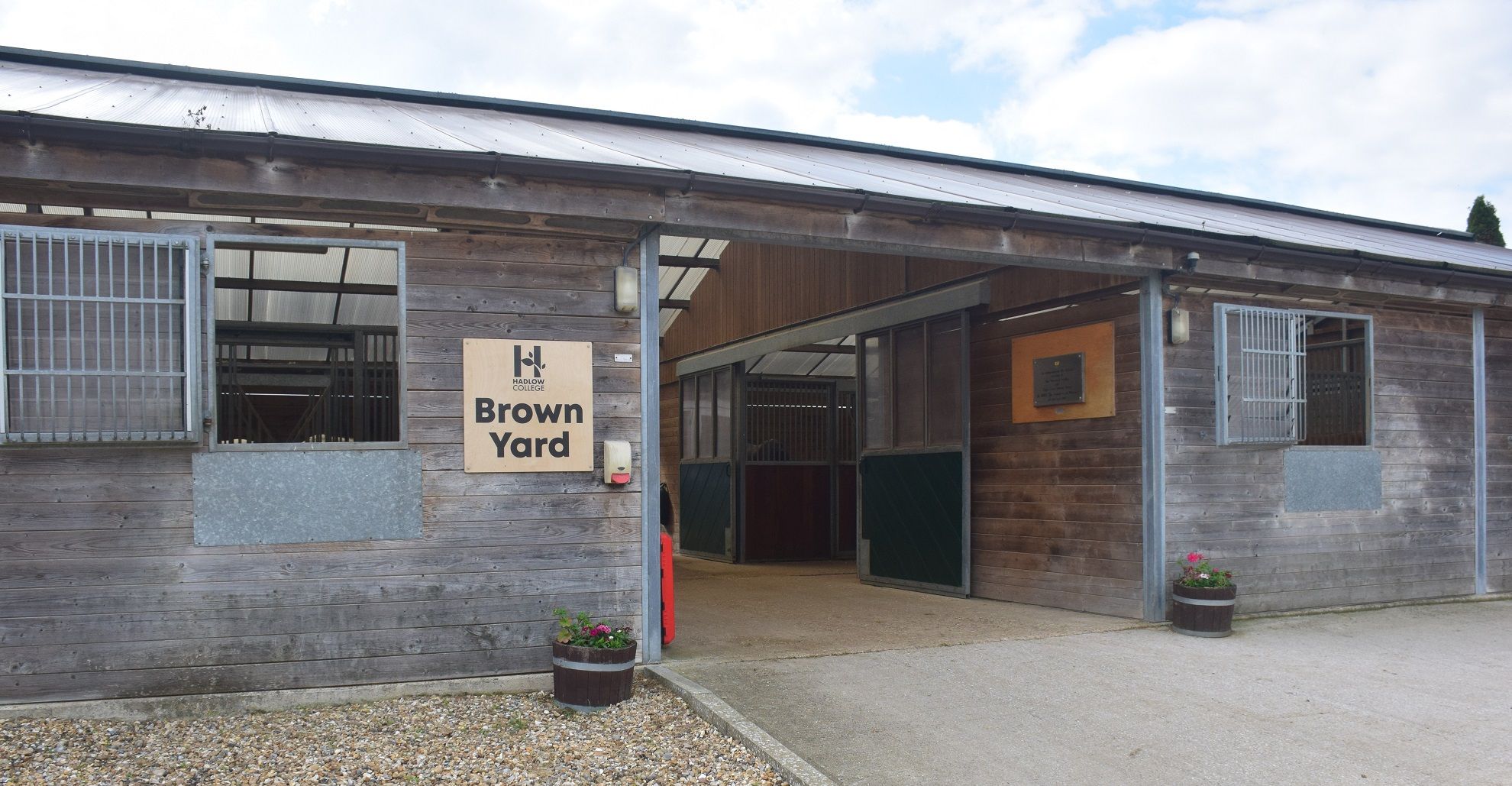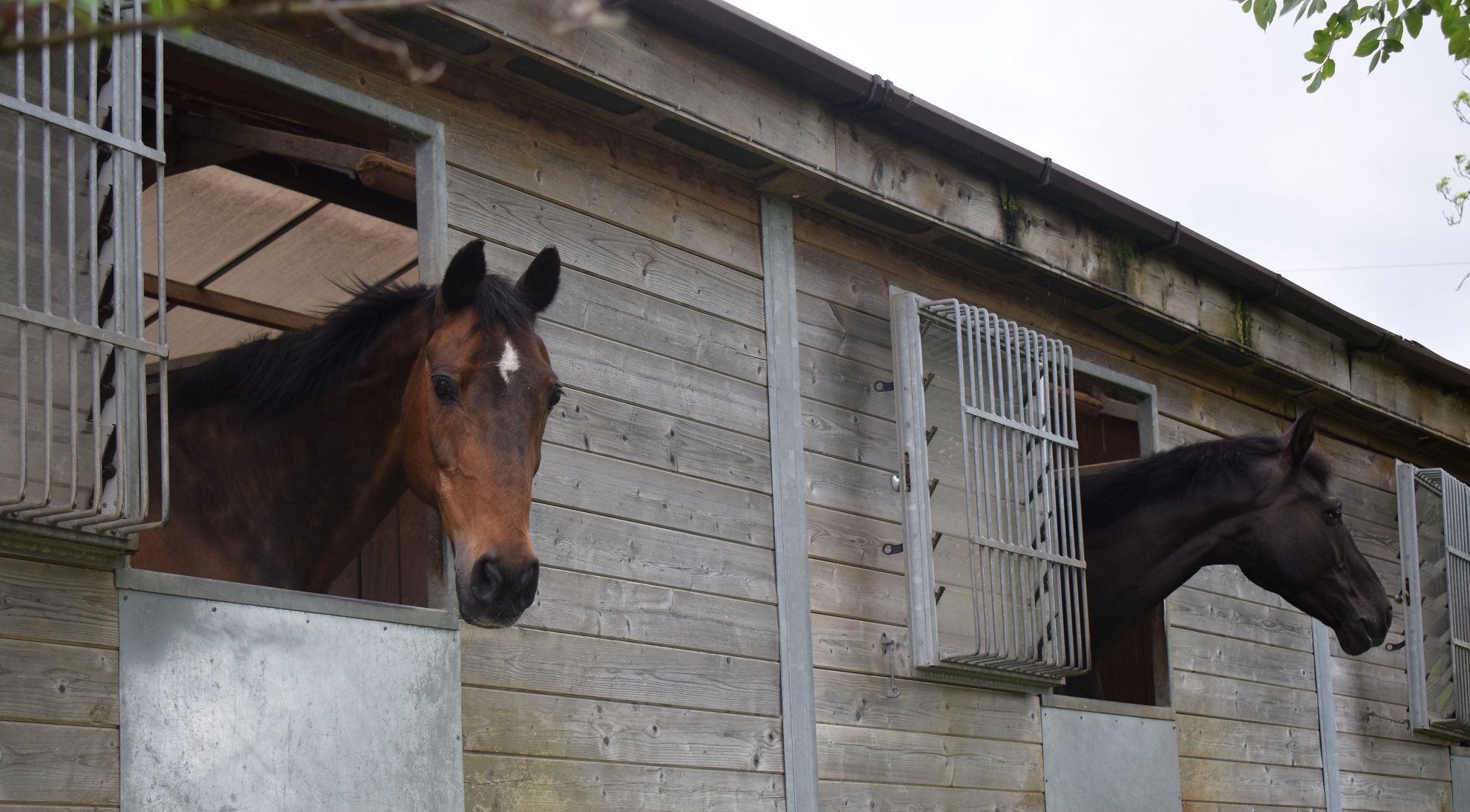The Equine Unit at our Hadlow campus is extensive to say the least.
It has two indoor arenas, a large outdoor arena and stabling for 64 horses. There are show jumps, cross country fences, a horse walker, a high-speed treadmill and more.
And all of that is needed when you are catering for an industry with around 900,000 horses and two million riders, and that is worth around £3.4billion according to the British Horse Industry Confederation.
The horse industry includes a number of different subcategories such as racing, polo, showjumping, dressage, eventing, carriage driving and more.
So as you can see an Equine Management qualification can open up a wide number of avenues for you.
Let’s take a look at some of the careers it could lead to:
Yard Manager

An equine yard manager is responsible for the day to day running of the yard. This includes managing staff, having overall care for all the horses and dealing with clients and owners.
They will also have to deal with vets, farriers, saddlers, physios and other equine professionals.
A Yard Manager will usually be helped by an Assistant Yard Manager.
Event Organiser
The horse industry is known for some of its big races and events such as the Badminton Horse Trials, Hickstead and the London Horse Show.
Being an event organiser you will learn a lot of transferable skills that will come in very handy in other jobs, should you ever move on. You’ll learn about marketing, budgeting, logistics and develop your communication skills.
The process of managing a horse show begins long before the event. You will need to reserve the show venue, speak to governing bodies, hire judges and determine show classes.
The governing organisations will also need to approve facilities, course designs, judges and show dates.
The event needs to be publicised and everything on the day needs to be set up efficiently and run like clockwork.
Even after the event there is the take down of equipment, tallying results and sending them to governing bodies and ensuring staff are paid.
Riding Instructor
The job of a riding instructor does exactly what it says on the tin, they will teach children and adults of all abilities how to ride a horse.
They might also have additional duties such as schooling, feeding, exercising and grooming the horses each day.
Competition Rider

If you are a professional competition rider you are being paid to train, ride and compete horses in regional, national and even international events.
It is a very competitive part of the equine industry, so it goes without saying you must be an exceptional rider, but you must also know all about the management, care and training of horses.
Becoming a competition rider takes hard work, sacrifice, determination, talent and a bit of luck, but it is a very rewarding career.
Equestrian Transporter
I am sure we have all been stuck behind a horse box or trailer at some point in our lives, but we might not have given too much thought to just how different it is to driving a car.
You are not only dealing with the additional size and weight of the vehicle, but you also have to take consideration for the horse onboard.
Anyone who transports a horse for economic activity (which is essentially for any business purpose) must hold a Certificate of Competence for the handling and transporting of horses.
Welfare Officer
The role of a Welfare Officer is varied, but many working in the role will be involved in raceday welfare, ensuring horses are well looked after both at the yard and at race meetings.
This includes ensuring that they are correctly identified with a microchip and passport, checking vaccination records and, in the event of horse racing, checking pre and post-race for prohibited substances.
A Welfare Officer could also work for organisations such as Red Wings, World Horse Welfare, the RSPCA and other equine and animal charities and be involved in rehabbing and rehoming horses.
Equine Vet
An equine vet specialises in the treatment of horses and providing routine care such as dentistry and vaccinations.
There will usually be one or more equine vets in attendance at sporting events, riding school inspections and for the pre-purchase vetting of horses.
Beyond this equine vets often play a key role in the management of breeding, feeding and preventative health care.
Equine Veterinary Nurse
Equine veterinary nurses work along vets to provide care and treatment to horses.
An equine veterinary nurse will be involved in a variety of tasks, that can vary from helping a vet who is carrying out surgery to mucking out and feeding horses.
However, whilst to become a vet you will need A Levels in Maths, Chemistry and Biology, the qualifications you will need to become an equine vet nurse are not so stringent, although you will need five GCSE’s at grade C or above (now a grade 4), including English and Science.
Competition Groom

A competition groom accompanies the rider to horse shows and has a wide variety of duties to ensure the horse is in tip-top condition for competition.
This can include packing fresh supplies for the event, clipping, bathing, dressing and loading the horses and ensuring they are ready to leave on time on the day, making sure the horses are clean and tidy at the start of the competition, doing anything necessary when the rider is warming up and then washing off and making certain the horses are comfortable and checked for injuries after the event.
Nutritionist
A nutritionist’s job is to tailor a horse’s diet to their individual requirements.
A key part of the role is in the formulation of feeds and supplements and identifying supplements to suit a horse’s lifestyle, breed and age.
A nutritionist also assesses health problems and has a clear understanding of the anatomy and physiology of a horse.
Studying Equine Management at Hadlow
We have a range of equine courses at Hadlow College and at the Royal Borough of Greenwich Equestrian Skills & Riding Centre in both Further and Higher Education.
Depending upon what you study you will get the opportunity to gain hands on practical experience and ride and compete quality horses.
There will also be the opportunity to develop practical skills in horse husbandry, horse handling, grooming, application of tack and equipment, feeding and routine yard management.
Our Higher Education courses include an Equine Training and Management Foundation Degree and a BSc (Hons) Equine Training and Management Top Up, with some of our Higher Education students going on to Masters and PhDs.
Whichever route you choose it is a very rewarding industry with many potential career routes.
To find out more visit the Equine Management page of our website for Further Education courses, or you can also view the Higher Education courses we offer.
